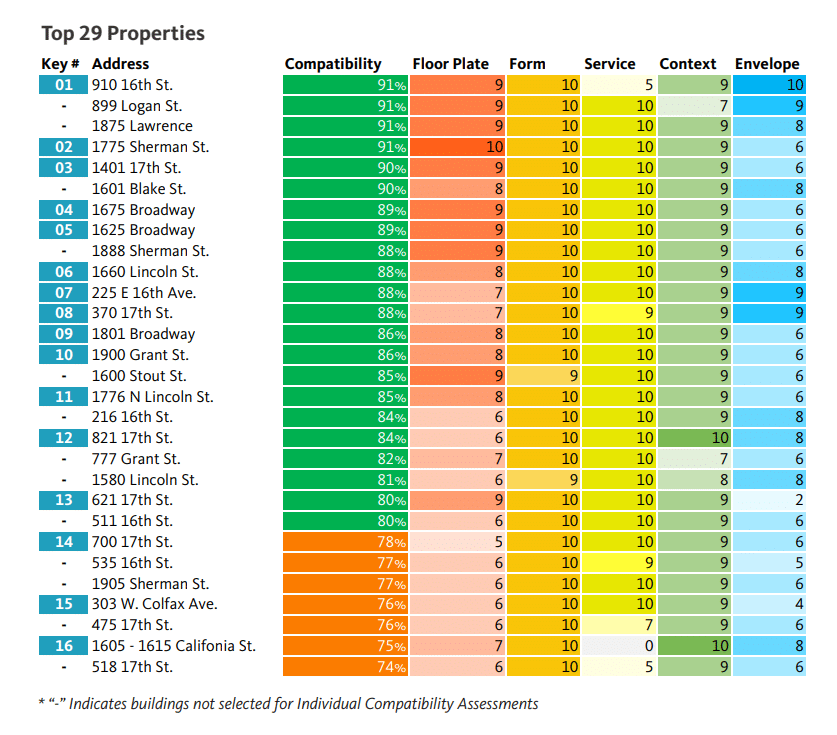
The view of downtown Denver from the roof of Assembly Student Living at 3900 Elati St. (Thomas Gounley/BusinessDen)
A study commissioned by the city has scored a host of downtown Denver buildings in terms of how easily they might be converted to residential use.
The study completed by Gensler, which was paid for with $75,000 in federal funds, was released last week. It plays into a larger conversation, happening in many cities, about efforts to add life to downtown with companies downsizing offices and staff spending less time there.
The study looked at about 70 buildings, and ultimately calculated a conversion “compatibility” score for 29 of them — including Republic Plaza, Denver’s tallest building — based on factors such as the shape of the building, floor plate size and area walkability.
Twenty-two buildings were classified as “good candidates” for conversion, with a score of 80 percent or above. The top score of 91 percent was awarded to four buildings: 910 16th St., 899 Logan St., 1875 Lawrence St. and 1775 Sherman St.
The remaining seven buildings were classified as possible conversion successes but in need of further study. Their compatibility scores were between 70 and 79 percent.
“It’s really for us to understand what is the potential for conversion in Denver,” said Jennifer Ramsey, a senior development project administrator with the city.

A chart from the study breaking down the compatibility score for 29 Denver office buildings. (City of Denver/Glensler)
There are caveats. Being named a “good candidate” doesn’t necessarily mean the building’s owner is actually interested in converting it to residences. All of the buildings are privately owned, with the exception of 303 W. Colfax Ave., which the city owns. Building owners didn’t ask or sign off on being included in the study. Office tenants often have long-term leases.
Additionally, and somewhat counterintuitively, the study didn’t look at several buildings where owners have already submitted plans for a possible conversion, such as the Petroleum Building at 110 16th St. and The George at 820 16th St.
Ramsey told BusinessDen that’s because those buildings are already far enough in the review process that the city and owners wouldn’t have learned anything from including them in the study.
But Denver now hopes to hear from more owners that are considering conversion.
In conjunction with the study’s release, Denver has launched an “adaptive reuse pilot program” for Upper Downtown, which generally has older buildings and greater vacancy than the other end by Union Station.
The five-building pilot program aims to support conversions by providing owners with a dedicated project coordinator — Ramsey herself — to guide them through the review and permitting process. The city is trying to determine if there are code or process changes it can make.
“Each of these projects is very unique,” Ramsey said. “They each have their own issues and concerns.”
To participate in the pilot, buildings must be at least 30 years old and 50 percent vacant. Owners can apply on the city’s website.
Ramsey said Thursday there are three slots in the pilot program remaining. She declined to identify the two buildings already in the program, but said one is historic and one isn’t, and that the owners’ interest in conversion has been previously reported.
In addition to 110 16th St. and 820 16th St., conversion plans have also been submitted to the city for 1600 Champa St. and the Capitol Center at 225 E 16th Ave. The Capitol Center was the only one of the four included in the study, netting a compatibility score of 88 percent.
Ramsey said building owners who aren’t committed enough to apply for the pilot program are also welcome to email her personally. Her contact information is listed on an adaptive reuse page of the city’s website.

The view of downtown Denver from the roof of Assembly Student Living at 3900 Elati St. (Thomas Gounley/BusinessDen)
A study commissioned by the city has scored a host of downtown Denver buildings in terms of how easily they might be converted to residential use.
The study completed by Gensler, which was paid for with $75,000 in federal funds, was released last week. It plays into a larger conversation, happening in many cities, about efforts to add life to downtown with companies downsizing offices and staff spending less time there.
The study looked at about 70 buildings, and ultimately calculated a conversion “compatibility” score for 29 of them — including Republic Plaza, Denver’s tallest building — based on factors such as the shape of the building, floor plate size and area walkability.
Twenty-two buildings were classified as “good candidates” for conversion, with a score of 80 percent or above. The top score of 91 percent was awarded to four buildings: 910 16th St., 899 Logan St., 1875 Lawrence St. and 1775 Sherman St.
The remaining seven buildings were classified as possible conversion successes but in need of further study. Their compatibility scores were between 70 and 79 percent.
“It’s really for us to understand what is the potential for conversion in Denver,” said Jennifer Ramsey, a senior development project administrator with the city.

A chart from the study breaking down the compatibility score for 29 Denver office buildings. (City of Denver/Glensler)
There are caveats. Being named a “good candidate” doesn’t necessarily mean the building’s owner is actually interested in converting it to residences. All of the buildings are privately owned, with the exception of 303 W. Colfax Ave., which the city owns. Building owners didn’t ask or sign off on being included in the study. Office tenants often have long-term leases.
Additionally, and somewhat counterintuitively, the study didn’t look at several buildings where owners have already submitted plans for a possible conversion, such as the Petroleum Building at 110 16th St. and The George at 820 16th St.
Ramsey told BusinessDen that’s because those buildings are already far enough in the review process that the city and owners wouldn’t have learned anything from including them in the study.
But Denver now hopes to hear from more owners that are considering conversion.
In conjunction with the study’s release, Denver has launched an “adaptive reuse pilot program” for Upper Downtown, which generally has older buildings and greater vacancy than the other end by Union Station.
The five-building pilot program aims to support conversions by providing owners with a dedicated project coordinator — Ramsey herself — to guide them through the review and permitting process. The city is trying to determine if there are code or process changes it can make.
“Each of these projects is very unique,” Ramsey said. “They each have their own issues and concerns.”
To participate in the pilot, buildings must be at least 30 years old and 50 percent vacant. Owners can apply on the city’s website.
Ramsey said Thursday there are three slots in the pilot program remaining. She declined to identify the two buildings already in the program, but said one is historic and one isn’t, and that the owners’ interest in conversion has been previously reported.
In addition to 110 16th St. and 820 16th St., conversion plans have also been submitted to the city for 1600 Champa St. and the Capitol Center at 225 E 16th Ave. The Capitol Center was the only one of the four included in the study, netting a compatibility score of 88 percent.
Ramsey said building owners who aren’t committed enough to apply for the pilot program are also welcome to email her personally. Her contact information is listed on an adaptive reuse page of the city’s website.
